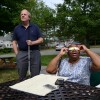Before John Lewis ascended to the place of the ancestors, he passed the baton to those who would continue his mission of social justice.
The former civil rights icon and Georgia congressman didn’t want there to be any misunderstanding about his charge to those he left to keep running the race. In an op-ed published in The New York Times the day after his death, Lewis urged young activists to get into “good trouble, necessary trouble” — the kind of trouble that was his lifelong commitment once he signed on to the campaign led by the Rev. Dr. Martin Luther King Jr.
In fact, Congressman Lewis’ words poignantly echoed those Dr. King delivered to the striking Memphis garbage workers the night before he died. In MLK’s now-famous “I’ve Been To The Mountaintop” sermon, he urged the Memphis garbage workers to keep fighting for justice, even as he preached that he might not get there with them. Congressman Lewis also acknowledged to his readers that he “may not be here with you.” And he went on to implore them to vote — because, as he wrote, the vote “is the most powerful nonviolent change agent you have in a democratic society.”
It’s not surprising Congressman Lewis had voting on his mind as he faced his last days. Winning the right to vote for Black Americans had nearly cost him his life that day on Selma’s Edmund Pettus Bridge where the then 25-year-old was beat by Alabama state troopers. The same vote also helped open up the doors of opportunity for him and millions more.
On this 38th anniversary of the Martin Luther King holiday, I am reflecting on the decades-long struggle to protect that vote, even as some stormed the Capitol to delegitimize the ballots of those who pushed back against voter suppression. They stood in long lines and organized to beat back old obstacles rebranded for these times. And they declared the racism of the president’s multiple lawsuits only targeting counties where voters of color are in the majority.
Congressman Lewis died three months before the November election day, in the midst of the president’s lies about a rigged election. He didn’t live to see the massive turnout which forced runoffs and later the eventual victories of Senate candidates the Rev. Raphael Warnock and documentary filmmaker Jon Ossoff. I can’t help but see their historic wins as a spiritual link from the Rev. King’s handpicked disciple, Congressman John Lewis, to the Rev. Raphael Warnock — Lewis’ pastor — and the now 33-year-old Ossoff, once a teenaged intern for the congressman.
Ossoff acknowledged Lewis’ posthumous blessing to The Jerusalem Post newspaper, saying, “I know Congressman Lewis is looking down on us today and beaming with optimism.”
But as optimistic as he was, Congressman Lewis was also clear-eyed about how disenfranchising millions of Americans is a threat to democracy. In his final op-ed, he warned, “Democracy is not a state. It is an act.”
Days after the second impeachment of President Trump and a Capital overrun by insurrectionists, his last words are a wakeup call.





